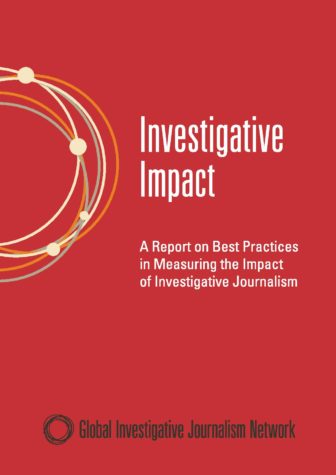Investigative Impact: A Report on Best Practices in Measuring the Impact of Investigative Reporting
 GIJN conducts ongoing research to find the best studies, reports, and data on the impact of investigative journalism. Our report summarizes the findings to date of this project, with a comprehensive survey of how investigative journalism impacts crime and corruption, accountability, public policy, and more.
GIJN conducts ongoing research to find the best studies, reports, and data on the impact of investigative journalism. Our report summarizes the findings to date of this project, with a comprehensive survey of how investigative journalism impacts crime and corruption, accountability, public policy, and more.
Investigative reporting has always been a struggle — for resources, time, funding, protection. In the West, with the media hard hit by shifting economics and technology, it has become far more difficult in recent years. Yet at the same time its practice has spread worldwide, and the digital revolution has given the field unprecedented tools, access, and opportunities for collaboration. New models have taken hold, from nonprofits and online start-ups to multimedia labs and university centers.
The World Bank and international development agencies, major foundations, and civil society groups all have grown to appreciate and support the role played by investigative journalists, particularly in developing and transitioning societies. With its financial base unsure, the field is in dire need of new sources of support. But to convince potential backers, we first must demonstrate the kind of impact that can result from systematic, in-depth, journalistic inquiry. With that in mind, we have gathered survey data, case studies, and scholarly reports from the development and media studies fields, as well as the best examples of high-impact investigative journalism.
There is no shortage of case studies. Consider just a few examples we’ve assembled: In September 2007 a Philippine court convicted the country’s former president, Joseph Estrada on charges of corruption. In 2010 Britain’s bribery laws were reformed following revelations about wrongdoing at BAE Systems, one of the world’s biggest arms companies. In the spring of 2013, governments around the world stepped up efforts to take on offshore-havens used for tax avoidance by big corporations and the wealthy.
These stories vary based on time, location, and the scope. But they hold one element in common: none of them could have happened without investigative journalists. It was the tenacious work of the Philippine Center for Investigative Journalism that led to Estrada’s impeachment. It was The Guardian’s team that unraveled the secret channels of bribery set up by BAE. And it was the collaboration of hundreds of journalists, led by the International Consortium of Investigative Journalists, that exposed the hidden dealings of off-shore companies.
The report has a detailed look at the best methods for measuring impact of investigative reporting. From complex software to relatively simple charting, the authors discuss the various ways devised in recent years to better gauge how journalists are making a difference, and makes recommendations about what appears most practical and effective for investigative newsrooms.
What is clear is that investigative reporting will remain fraught with difficulty. Investigative journalists face a litany of challenges — legal harassment, imprisonment, physical threats, uninterested publishers, corrupt owners, a lack of resources, and scarce funding. Yet the journalists keep pushing, and the practice continues to spread worldwide. Why? Because in-depth, watchdog reporting is indispensable for any healthy and open society. By holding the powerful accountable and monitoring the performance of public institutions, investigative journalism contributes to building and maintaining vibrant democracies.
Nobel Prize winning economist Joseph Stiglitz, who served as chief economist for the World Bank, calls investigative reporting “part of the enforcement mechanism” that societies need by providing “checks against abuses that otherwise would occur.” Says Stiglitz: “Investigative journalism is absolutely essential.” This report shows you why.
